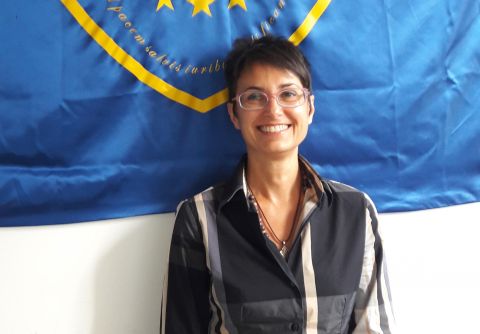
Antonella Di Sandri, from Italy’s northeast, was appointed as a Senior Customs Officer in the city of Udine in 1999, and for the past two decades has worked on customs issues in her home country as well as EU-funded projects in the Balkans. Since July 2017, she has been seconded by the Italian authorities as a Border Customs Expert at EUBAM Rafah to support capacity building in the Palestinian General Administration for Borders and Crossings (GABC).
Under the Paris Protocol on Economic Relations signed between the Israelis and Palestinians in 1995, the responsibilities for managing customs matters are shared, with the Palestinian side having an important role in protecting Palestinians from items that are dangerous to health or violate intellectual property rights.
“Counterfeit goods are a threat,” explains Di Sandri, who speaks about her work supporting the GABC in the fight against counterfeiting with pride. “They not only undermine intellectual property and the economy, but they also carry health risks – particularly counterfeit medicines or food. We coordinated a training map with a number of activities and workshops for the GABC using resources from the EU’s TAIEX funds. This helped to increase the awareness of our Palestinian counterparts about intellectual property rights and the fight against counterfeiting”.
The Italian customs expert underlines the importance of cooperation: “The trainings on intellectual property and counterfeiting were valuable for customs officials, but also for police officers and intelligence officers as well as for officials from the Ministries of Health and Agriculture”.
Encouraging inter-agency cooperation is a core task of EUBAM Rafah, which advises on Integrated Border Management (IBM) – a philosophy which aims to increase the efficiency of agencies working on the border. “It’s a concept that allows all the border agencies within their field of competence to manage border aspects in an optimal way,” explains Di Sandri. “It allows different stakeholders, e.g. the police, customs, and other agencies to integrate their activities, and avoid overlapping competences”.
The work being done by the Pangea operation, coordinated by Interpol, is cited by Di Sandri as a good example of joint customs-police cooperation in the fight against counterfeit medicine, and she has coordinated trainings for Palestinian partners that emphasise the importance of joint work. These training sessions were delivered by experts from the European Anti-Fraud Office (OLAF), who themselves have supervised large customs-police cooperation projects. She believes these best practices can provide inspiration for the GABC.
Di Sandri has also recently been working on projects with OLAF and the Palestinian Anti-Corruption Commission (PACC) to on anti-corruption measures and strategies, drawing up codes of conduct, working on an official definition of corruption at the border and other measures designed to increase the safety and security of the borders. This work has been temporarily suspended as a result of the Covid-19 crisis, but is scheduled to resume in the near future.
On the Covid-19 crisis, the Italian expert says, “the challenges for border agencies are vast. First, you have the health concerns – preventing people or goods which carry infection to cross the border. You have non-essential staff who cannot go to their offices, which has an impact. You also have new kinds of goods that need to be checked – personal protective equipment, medical devices, which you want to pass checks as quickly as possible, but also ensure are safe. And there is also the issue of less revenue being collected, as fewer goods are passing through”.
Despite the challenges, Di Sandri is looking forward to EUBAM Rafah’s new mandate period, which will run from 1 July – 30 June. “I am planning to resume my work with OLAF, GABC and PAC on the fight against corruption. I would also like to explore the protection of cultural goods – this has a great importance in the Middle East. We will also continue to supporting our partners in strengthening managerial capacities, as well as boosting GABC’s ability to deliver training independently”.
Please note: The photos displayed in this news were taken before the introduction of emergency measures to combat the spread of Covid-19